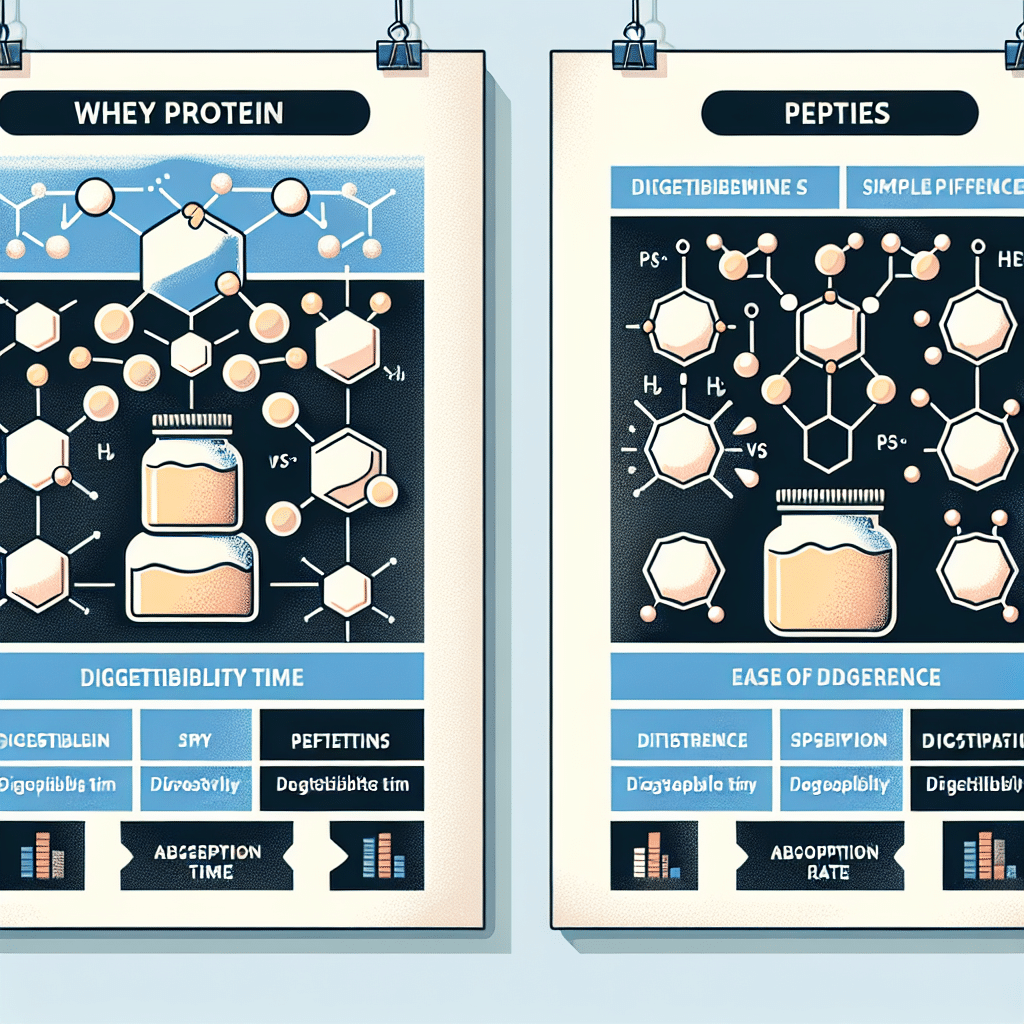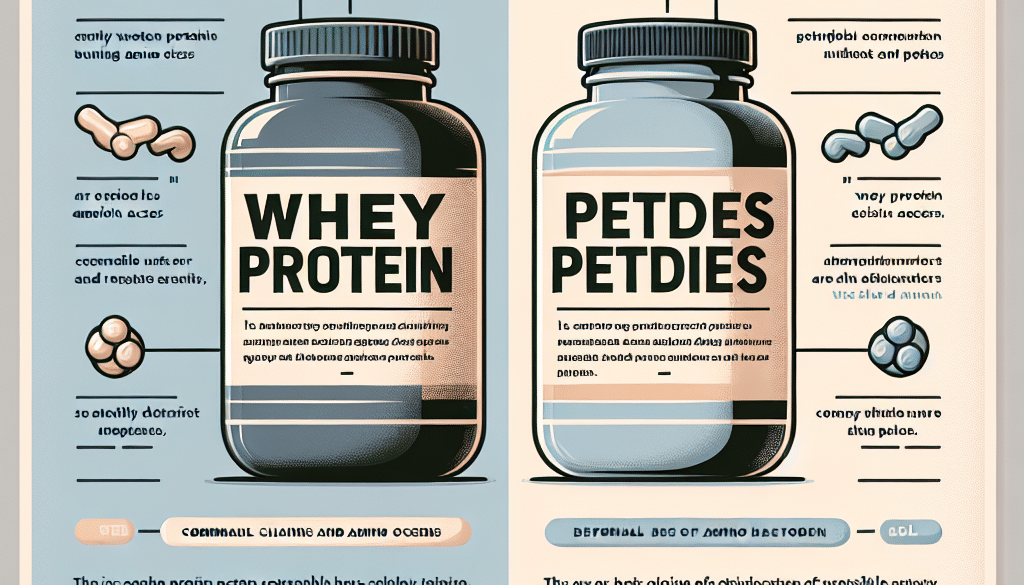What Is The Difference Between Whey Protein And Peptides?
-
Table of Contents
- Whey Protein vs. Peptides: Understanding the Differences
- What is Whey Protein?
- What are Peptides?
- Key Differences Between Whey Protein and Peptides
- Composition and Absorption
- Functionality and Benefits
- Use in Supplements
- Benefits of Whey Protein
- Benefits of Peptides
- Choosing Between Whey Protein and Peptides
- Case Studies and Research
- Conclusion: Key Takeaways
- Discover ETprotein’s High-Quality Protein Products
Whey Protein vs. Peptides: Understanding the Differences

Protein is a crucial macronutrient that plays a vital role in building and repairing tissues, making enzymes and hormones, and supporting overall health. Among the various sources of protein, whey protein has gained immense popularity, especially among athletes and fitness enthusiasts. However, with the rise of specialized supplements, peptides derived from whey are also becoming a focus of interest. Understanding the difference between whey protein and peptides is essential for making informed decisions about supplementation and nutrition.
What is Whey Protein?
Whey protein is a high-quality, complete protein that contains all nine essential amino acids. It is a byproduct of cheese production and is highly digestible and rapidly absorbed by the body. Whey protein comes in several forms, including concentrate, isolate, and hydrolysate, each varying in protein content, lactose, and fat levels.
What are Peptides?
Peptides are short chains of amino acids linked by peptide bonds. They are essentially small fragments of proteins and can be more easily absorbed into the bloodstream than whole proteins. Peptides can be naturally occurring or synthetically created and have a range of biological functions, including signaling, immune response, and tissue repair.
Key Differences Between Whey Protein and Peptides
Composition and Absorption
One of the primary differences between whey protein and peptides lies in their composition and how the body absorbs them. Whey protein is composed of longer chains of amino acids that require digestion before absorption. In contrast, peptides, being shorter chains, are more readily absorbed because they bypass some of the digestive processes that proteins undergo.
Functionality and Benefits
While both whey protein and peptides can support muscle growth and recovery, peptides may offer additional benefits due to their smaller size and specific amino acid sequences. For example, certain peptides have been shown to have anti-inflammatory properties, promote wound healing, and support immune function.
Use in Supplements
Whey protein supplements are commonly used to increase dietary protein intake, support muscle building, and aid in recovery after exercise. Peptides, on the other hand, are often found in more specialized supplements targeting specific health outcomes, such as collagen peptides for skin health or creatine peptides for muscle energy.
Benefits of Whey Protein
- Supports Muscle Growth: Whey protein is rich in branched-chain amino acids (BCAAs), which are crucial for muscle protein synthesis.
- Weight Management: High-protein diets that include whey protein can help in weight management by promoting satiety and preserving lean muscle mass during weight loss.
- Convenience: Whey protein powders are a convenient way to increase protein intake, especially for individuals with high protein requirements or those with limited time to prepare protein-rich meals.
Benefits of Peptides
- Enhanced Absorption: Due to their smaller size, peptides can be absorbed more quickly and efficiently than whole proteins.
- Targeted Effects: Specific peptides can have targeted effects on health, such as improving skin elasticity or reducing inflammation.
- May Improve Digestive Health: Some peptides have been shown to have beneficial effects on the gut, potentially improving digestive health and reducing symptoms of gastrointestinal disorders.
Choosing Between Whey Protein and Peptides
The choice between whey protein and peptides depends on individual goals, dietary preferences, and health needs. Whey protein is a versatile and well-researched supplement that can benefit most people looking to increase their protein intake. Peptides may be more suitable for those seeking specific health benefits or who have digestive issues that make absorbing whole proteins challenging.
Case Studies and Research
Several studies have highlighted the benefits of both whey protein and peptides. For instance, research has shown that whey protein supplementation can enhance muscle protein synthesis and promote recovery after resistance training. Similarly, studies on bioactive peptides have demonstrated their potential in managing blood pressure, reducing inflammation, and improving antioxidant status.
Conclusion: Key Takeaways
Whey protein and peptides both play a role in nutrition and supplementation but differ in their composition, absorption, and specific health benefits. Whey protein is a complete protein ideal for increasing overall protein intake and supporting muscle growth. Peptides offer more targeted health benefits and may be better absorbed. When choosing a supplement, consider your health goals and dietary needs to determine which option is best for you.
Discover ETprotein’s High-Quality Protein Products
If you’re looking for premium protein supplements, ETprotein offers a range of products to meet your needs. From organic plant-based proteins to specialized peptides, ETprotein ensures quality and purity in every product. Explore their offerings to find the perfect supplement for your health and fitness journey.
About ETprotein:
ETprotein, a reputable protein and L-(+)-Ergothioneine (EGT) Chinese factory manufacturer and supplier, is renowned for producing, stocking, exporting, and delivering the highest quality organic bulk vegan proteins and L-(+)-Ergothioneine. They include Organic rice protein, clear rice protein, pea protein, clear pea protein, watermelon seed protein, pumpkin seed protein, sunflower seed protein, mung bean protein, peanut protein, and L-(+)-Ergothioneine EGT Pharmaceutical grade, L-(+)-Ergothioneine EGT food grade, L-(+)-Ergothioneine EGT cosmetic grade, L-(+)-Ergothioneine EGT reference grade and L-(+)-Ergothioneine EGT standard. Their offerings, characterized by a neutral taste, non-GMO, allergen-free attributes, with L-(+)-Ergothioneine purity over 98%, 99%, cater to a diverse range of industries. They serve nutraceutical, pharmaceutical, cosmeceutical, veterinary, as well as food and beverage finished product distributors, traders, and manufacturers across Europe, USA, Canada, Australia, Thailand, Japan, Korea, Brazil, and Chile, among others.
ETprotein specialization includes exporting and delivering tailor-made protein powder and finished nutritional supplements. Their extensive product range covers sectors like Food and Beverage, Sports Nutrition, Weight Management, Dietary Supplements, Health and Wellness Products, and Infant Formula, ensuring comprehensive solutions to meet all your protein needs.
As a trusted company by leading global food and beverage brands and Fortune 500 companies, ETprotein reinforces China’s reputation in the global arena. For more information or to sample their products, please contact them and email sales(at)ETprotein.com today.












